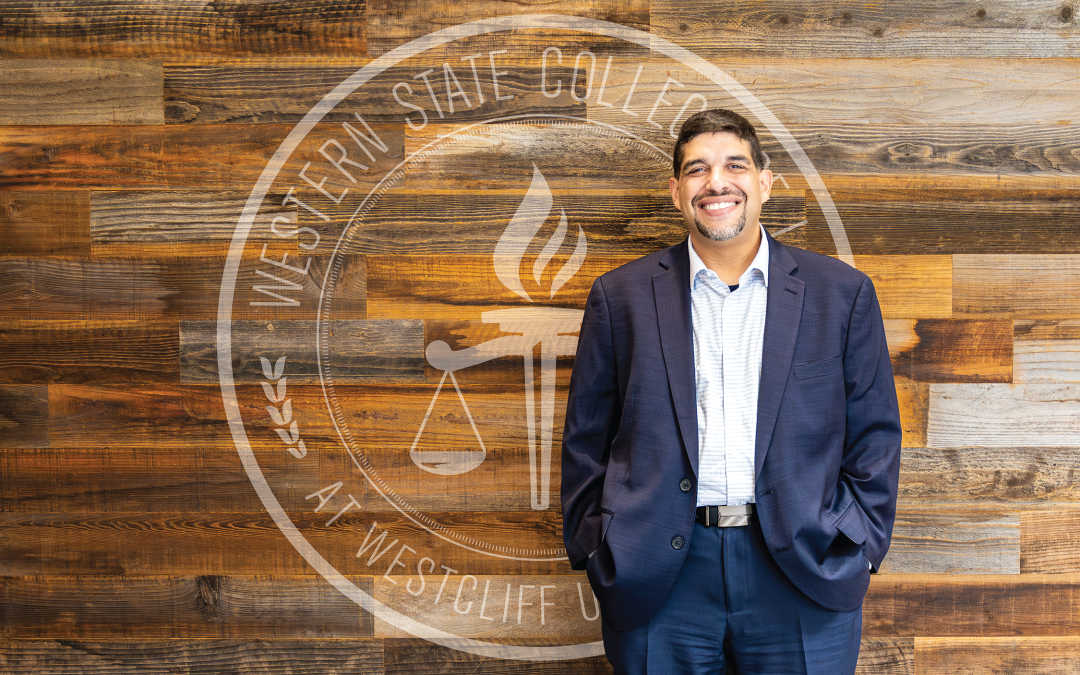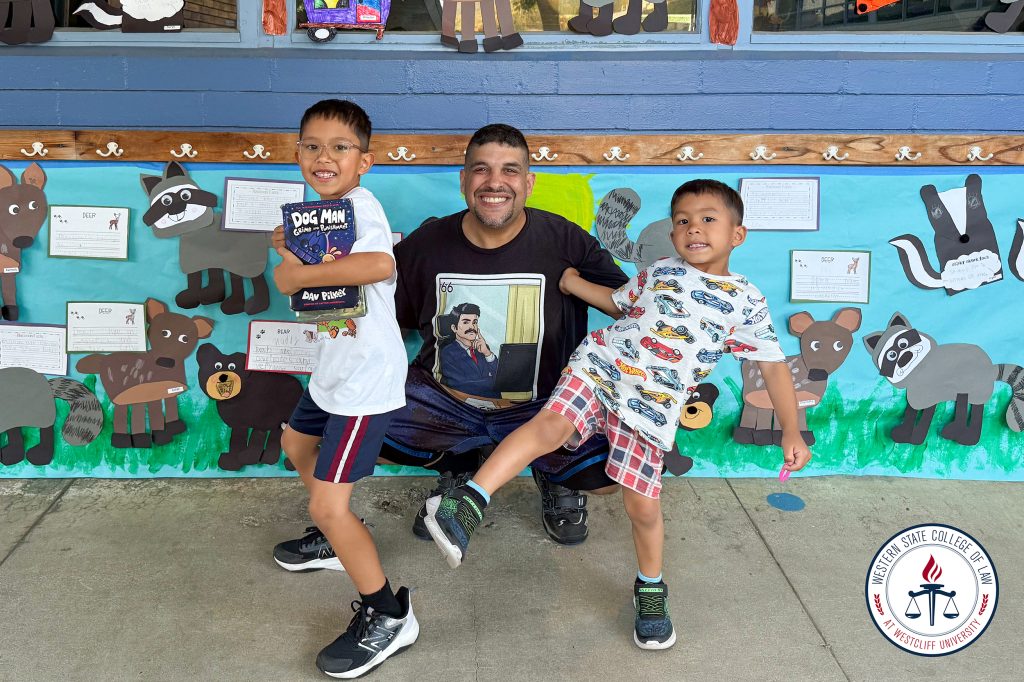Written by: WSCL Marketing Team
Bringing the Law to Life
During our new faculty welcome event, Franco Torres, a new professor at Western State College of Law, explained how he interactively teaches his Torts class:

“I had just introduced the concepts of assault and battery when I paused, walked toward the front row, and suddenly threw my hand up—not in a threatening way, but just enough to make a student flinch. I asked the class, ‘Did I just commit assault?’ and instantly, we were deep into the analysis: Was there intent? Apprehension? Immediacy? It took the abstract definition and made it real. You could feel the shift in the room—students were no longer just observers; they were engaged, applying doctrine to a lived moment.”
It was immediately obvious that this was a professor who genuinely cares about making his students understand the law, immersing them wholly in the subject as real-life scenarios they can pick apart and analyze from every angle.
In Professor Torres’s Torts class at the ABA-accredited law school, you’ll see this philosophy in action. Instead of just lecturing, he turns each lesson into a hands-on experience, encouraging students to explore, question, and even act out legal concepts as they learn.
Interactive Teaching from the Start
From his first week teaching at Western State, Professor Torres started using his interactive teaching methods, like the “assault” roleplay example mentioned earlier. “I bring a practitioner’s mindset into the classroom,” he explains. “I want students thinking like lawyers from day one. That means they need to engage, not just absorb.”
Professor Torres approaches every single class in a way that engages the students. He puts together exercises that get students thinking together, makes cold calls feel like real conversations, and uses scenarios that make students really explore applications of the law. “I’ve seen firsthand how students grow when they’re trusted to apply the law, not just memorize it,” he explains. “That inspiration comes from my own mentors, people who didn’t just teach theory, but modeled legal judgment and invited me to develop my own.”
Intentional Teaching with Cultural Context
Professor Torres’s lessons are always intentional. They draw as much from his own experiences in nonprofits and immigrant rights advocacy as they do from his legal training. Mentoring young attorneys has also influenced his lessons and how he connects with students. “Mentorship has shown me how much students carry beyond the classroom: their identities, struggles, ambitions,” he says. “So I approach teaching with empathy and intentionality,” he says.
Professor Torres is always looking for ways to make the law resonate with his students. And he often uses pop culture to make a point. After noticing his students had trouble with a Torts quiz, he took the time to figure out where and why they’re getting stuck and designed a lesson to specifically overcome those hurdles. “I did a deep dive breakdown, not only on the rule and how to apply it, but I connected it back to the cases that idea came from,” he explains. “I gave them exam tips, images to visualize the problems, even humor to cut the tension. My goal was to get their attention and help them breathe, to take the anxiety down a little.”
Making the Abstract Concrete
For Professor Torres, teaching is part art, part science, and part improv. He’s quick to make changes when a lesson isn’t landing right. He uses images, metaphors, pop-culture references—anything to simplify complex doctrine.
Take his breakdown of intent in battery cases, for example: “There’s a problem involving a mentally ill person who throws a rock at a kid. Later, it’s revealed that she’s hallucinating,” he states. “The question isn’t just about mental illness as a defense—it’s about whether intent was ever there. I use a noisy, distorted image and ask, ‘Can you find intent in this picture?’ It’s a way to help them see what the law is really asking.”
One recent ‘transfer of intent’ problem caught students off guard. It’s a problem where someone aims at a deer but accidentally hits a person, testing whether intent can transfer from animal to human. “Students wanted to transfer intent from shooting a deer to accidentally shooting a person. But the law draws a line between animals and people,” he says.
To make the lesson memorable, Professor Torres used a ‘Fear the Deer’ meme from the Milwaukee Bucks to grab students’ attention. He then explained why the law treats people and animals differently: “It all comes back to personal dignity. Our legal tradition evolved from a time when some people were considered property, but modern tort law draws a sharp distinction—harm to a person is about personal rights and dignity, while harm to an animal is treated as property damage.”
A Dash of Pop Culture
Professor Torres often draws inspiration from music, sports, and pop culture when designing interactive lessons. These references help students see the law in familiar, everyday settings.
“If you’re in a packed club, you might get bumped—that’s not battery,” he explains. “But if someone’s running around hip-checking people on an empty dance floor, that’s a different story. We even get into the finer points of consent in a mosh pit! Students bring up their own examples, and we run with them.”
Bridging Generations and Building Confidence
What stands out most in talking to Professor Torres is how much he enjoys teaching this generation of students. “They want to be here, they want to learn,” he says. He sees Western State’s students as hardworking, grounded, and refreshingly kind. “There’s a groundedness here that I appreciate. Western State students are often juggling a lot, but they show up curious and ready to put in the work. That energy makes teaching here really rewarding.”
But he’s also realistic about the anxieties that 1Ls face. Law students, Professor Torres explains, typically want certainty, especially in their first year. But, he reminds them, “The anchors in the law aren’t rooted in concrete, they’re rooted in sand so that they can move.” He wants students to catch how the law evolves with societal norms. His goal is to have every student walk out of class feeling confident. As Professor Torres says, “My job is to help students believe in their ability to read the law, interpret it, and use it to advocate.”
Lessons Beyond the Law: Practical Excellence and Cultural Humility
At the heart of Professor Torres’s teaching are two core values: practical excellence and cultural humility. He wants students to be ready to draft, argue, and think strategically, but also reminds them, “Law isn’t just about being right; it’s about listening, learning, and understanding the people behind the problems.”
And this is still a work in progress for Professor Torres, who also learns from teaching his students. “I try to model that by being transparent about what I’m still learning, too. I think it makes the whole space more real,” he states.
His background in immigrant rights work influences a lot of his classroom lessons. “Context matters. Every student is showing up with a story,” Torres says. He aims to create structure and clarity while making space for students’ perspectives, choosing examples and assignments that help his classroom “feel rigorous but also human.”
Student-Centered Innovation
Perhaps one of the clearest signals of Professor Torres’s commitment to students is the way he adapts his methods in real time. When a student pointed out a math error in his syllabus, he didn’t just fix it—he adjusted the grading in students’ favor, boosting open-book, practical assignments. When another student shared feedback about briefing cases, Professor Torres reworked his lectures, adding transitions, breaking slides into digestible chunks, and sharing updated slides after class.
“I want them to have the material. I’m not going to hide the ball from them. You could have gone to another school, but you chose to come to a place where you’re going to get a real, practical education,” he states. “My job is to help you know the law and how it works.”
He’s the kind of professor who stays after class to answer questions, spots students at public interest events, and keeps a running list of students whose contributions make learning in class stronger.
Finding Balance: Family, Gardening, and Sci-Fi


When he’s not teaching or prepping lessons, Professor Torres is a devoted father of two young boys—playing baseball, building Lego towers, or watching the latest animated movie.
A self-proclaimed sci-fi and history buff who loves “Star Wars, Star Trek, and the Ender series,” he finds time to tend to his garden, coaxing apples, lemons, and the occasional stubborn strawberry out of Southern California soil. “Gardening is my way to disconnect and reset. There’s a good energy that comes from working with plants, and it’s something I love sharing with my family.”
Born and raised in Brooklyn, Professor Torres still considers himself a New Yorker at heart—though he’s happy to leave the winters behind. Admitted to both the New York and Florida bars, he now calls Glendora home and has found a true sense of community at Western State, the oldest law school in Orange County and one of the most affordable law schools in California. “I feel incredibly grateful to be here. I know how important legal education can be, and it means a lot to be part of a school that’s committed to access, inclusion, and growth.”
Looking Ahead: A Passion for Growth
Asked what excites him most this year, Professor Torres says, “I’m excited to grow into this role, to keep refining my teaching, and to keep learning from my students.” He’s also looking forward to contributing more broadly, from supporting faculty development and mentoring others to helping the school expand programs that address the evolving needs of the legal field.
His advice for students is simple: “Stay curious and keep asking good questions.” While law school often focuses on finding answers, Torres believes, “The best lawyers I know are the ones who know how to pause, dig deeper, and think critically—not just about the law, but about people and systems.” For him, curiosity is the key to growth and effective problem-solving.
For those who might feel shy about speaking up in class, Professor Torres has a final word of encouragement: “Your voice matters—even when it shakes. Participation doesn’t have to be loud to be powerful.” By looking for authentic ways to contribute, he believes students can build confidence over time. “Eventually, that voice will get stronger,” he says.
Western State College of Law is proud to welcome Professor Franco Torres—an educator whose energy, empathy, and practical wisdom are already making a lasting impression on students and colleagues alike. As he brings the law to life in the classroom and champions a student-centered, inclusive approach, there’s no doubt he’ll continue to shape the next generation of lawyers, thinkers, and advocates.



